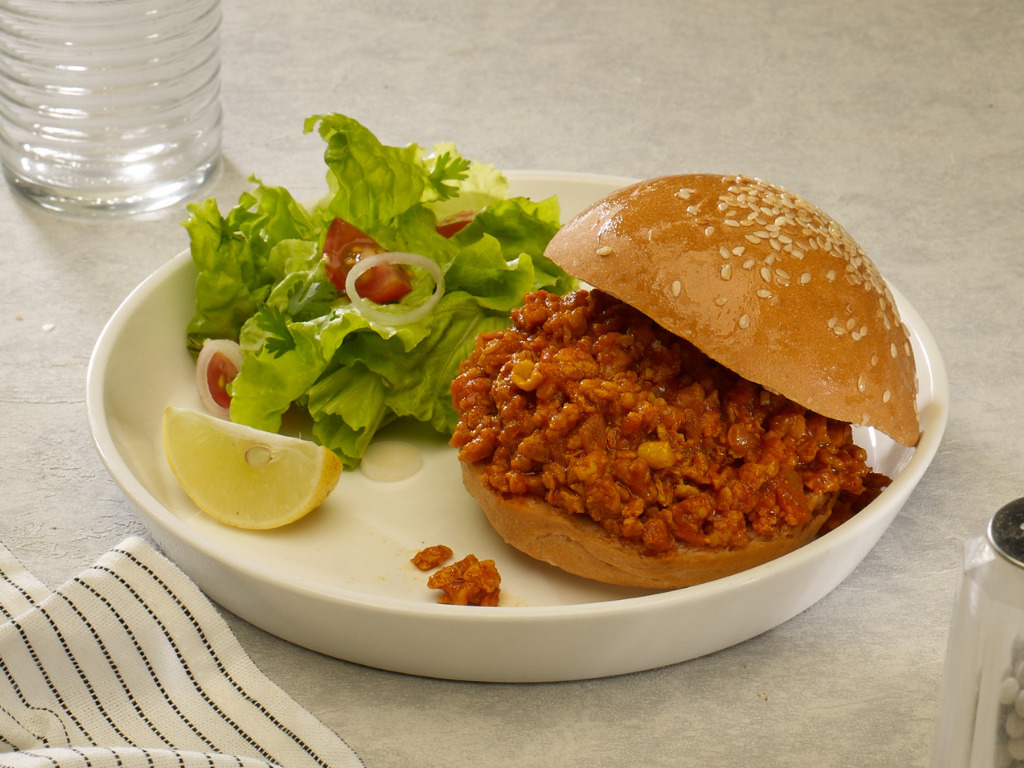4 Mins Read
Food tech startup Blue Tribe Foods unveiled its vegan chicken nuggets and keema in the Indian Tricity – Chandigarh, Panchkula, and Mohali. The company aims to raise awareness about the unsustainable meat industry practices and help consumers transition to a sustainable alternative diet, especially in the Tricity famous for its traditional meat dishes.
Tapping into the Indian meat market
Earlier this year, Mumbai-based Blue Tribe founded by Nikki Arora Singh and Sandeep Singh unveiled its plant-based nuggets in Mumbai, Delhi, Pune, Bengaluru, and Hyderabad.
Now, the company has moved its sights on the Tricity – Chandigarh, Panchkula, and Mohali which are famous for their animal-based chicken tikka, butter chicken, and lamb champ dishes. By bringing its plant-based chicken nuggets and keema to the region, the company aims to make vegan foods a favourite among consumers.
The products are created from soybeans and peas and Blue Tribe has started to locally produce its products in the Chandigarh Tricity.
“We are thrilled to launch our plant-based meat products in the cities known for delectable non-vegetarian cuisines containing wholesome protein, vitamins and other nutrients,” said co-founder of Blue Tribe, Sandeep Singh in a statement. “This is sort of a true test for us, if we can encourage meat lovers in Chandigarh and surrounding areas, it will take us one step closer to our ultimate goal of reviving and rejuvenating mother Earth.”

We are thrilled to launch our plant-based meat products in the cities known for delectable non-vegetarian cuisines containing wholesome protein, vitamins and other nutrients
Sandeep Singh, co-founder of Blue Tribe
Majority of Indians open to plant-based foods
The company conducted a survey last year to understand how many consumers are willing to try out plant-based foods.
Respondents were between the ages of 20-45 and based in metro cities like Mumbai, Delhi, and Bengaluru, out of which 62% of animal-based meat eaters said they don’t mind trying out plant-based meats. Nearly all of the respondents cited taste as the top reason for making decisions when it comes to having traditional meat.
Singh added, “It is extremely important to understand that we are in no way asking people to stop eating non-vegetarian food. As of now, the overabundance of meat production in the world is dangerously contributing to the rapid emission of greenhouse gases in the environment. We simply want to offer an alternate plant-based meat product so that the excess meat production can be reduced and nature can take a breath of fresh air.”
Another study showed that 77% of consumers are ready to try plant-based meat products. And, although animal-based foods are popular among the younger population, 25% are looking for ways to limit their consumption of these products.
Read: Q&A w/ Philippines Plant-Based Pioneer WTH Foods: “To Market To The Masses, Taste Is Number One”

We simply want to offer an alternate plant-based meat product so that the excess meat production can be reduced and nature can take a breath of fresh air
Sandeep Singh, co-founder of Blue Tribe
At the moment, consumers can purchase these products through Blue Tribe’s website. The company is working on DTC and HORECA business models and apart from the above-mentioned cities, it has cemented its presence in Kochi, Chennai, and Kolkata.
Going forward, it plans to introduce its product offerings in Indore and other cities of India and soon launch plant-based chicken and pork sausages made with pea protein.
Apart from Blue Tribe, another Indian startup PlantMade unveiled what it claims is the country’s first vegan lamb seekh kebabs adding to its existing range of plant-based egg and dairy alternatives.
India’s leading manufacturer of specialty oils and fats, AAK teamed up with food suppliers Vista Processed Foods to tap into India’s alternative protein sector by scaling innovation and the production of plant-based meat analogues. To further support solutions and guide companies in this sector, Good Food Institute India unveiled the first India Good Food Startup Manual.
Lead image courtesy of Blue Tribe Foods.



